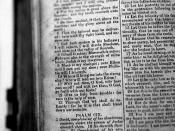The Bible has never been proven wrong. Many people have tried to find it's weaknesses and failed, and those that may have an evil desire to alter God's word to his followers, are met with this curse: "...if anyone adds anything to what is written here, God will add to that person the plagues described in this book. And if anyone removes any of the words of this prophetic book, God will remove the person's share in the three of life and in the holy city described in this book." (Revelation 22:18-19, NLT). A fate no one is likely to wish for. No other book causes such emotional upheaval as the Bible. Because of this, there will always be questions and suspicions raised, strong enough to sway our thoughts and cause us to contemplate the absoluteness the Bible offers-the theological question of translation and versions of the book certainly not being left out.
Todd Strandberg, founder of the website Raptureready.com writes, "The New International Version Bible is probably the most attacked of all the modern versions, but any errors it might contain are subtle ones. The NIV doesn't say something like, 'Our Lord Satan who art in Heaven' (Mat. 6:9)" The truth is, each version, though varying in basic structure and word choice, conveys the same message and content. In this discussion of translation, the King James Version (KJV), The New King James Version (NKJV), The New International Version (NIV), The New American Standard Bible (NASB), and the Revised English Bible (REB) are the versions I chose to explore a passage in Job (11:10-20).
On Translation
Up until very recently, I was unaware of any other versions of scripture existing besides the NIV and King James Bibles. It wasn't until I was talking with a close friend, sharing favorite passages,



Very Good Essay!
I agree wth the content in this essay. I own a King James Version Bible, and I sometimes don't get the same undrerstanding at all as my friends with New Living Translation Bibles.
7 out of 7 people found this comment useful.